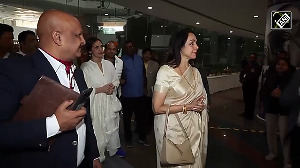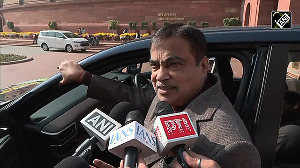 Today's Budget may well have an allocation for the Right to Education Act that has activists up in arms, but Human Resources Development (HRD) Minister Kapil Sibal is convinced their fears are unfounded.
Today's Budget may well have an allocation for the Right to Education Act that has activists up in arms, but Human Resources Development (HRD) Minister Kapil Sibal is convinced their fears are unfounded.
His decision to develop a core curriculum has got many worried, that he may be killing diversity in education, that he should test for outcomes and not prescribe courses.
Sibal explains, and then defends his positions to Sunil Jain and Kalpana Jain, and dismisses the immediate possibility of any globally-renowned institution setting up a full-fledged campus in India.
Excerpts:
Does your common SAT-type test mean you now want to abolish the Class XII board exams?Not at all! The Class XII boards, I have been saying, test subject matter knowledge (on say, chemistry) but do little to test the child on her breadth of knowledge, aptitude and other important aspects like this. So, I have set up a task force (so it's not a done deal yet) to see how we can design a test, for now, only for those who want to go to professional courses in science - later, we will see if this can be extended to other disciplines. There is already a task force along these lines for the commerce stream.
I'll have to see what the recommendations are, but the broad idea at this point is that there will be a Class XII examination (whether it will be marks or grading remains to be seen) to test subject matter knowledge, and this will be given a certain weight - the SAT-type test will test for aptitude and will be used in addition to the Class XII exam. The exact weights will be decided by the task force. This is not an extra exam since, even now, all those who wish to get into engineering, management, etc take various entrance exams.
Indeed, the plan is to have just one examination for all these courses and, perhaps, even extend this to other streams - let's see.
But why don't you just test students on outcomes, why do you need a common curriculum?
It is not a common curriculum, it is a core one. There is a big difference. When you're doing a common test across the country, there have to be certain core aspects on which you test. So, the education boards need to agree on this. I first mooted the idea six months ago at the meeting of the boards (around 25 of them deal with Class XI and XII) and asked if we could have a core curriculum - on what the child should be tested - in subjects where there is little diversity.
The boards all agreed. It will allow everyone a level-playing field. There can be diversity in history, but even here, if the boards agree, we could have a core curriculum (this could have, for instance, a part on India's freedom movement) which would then give each board the freedom to add on a non-core curriculum - so, in Maharashtra, you could teach Shivaji in greater detail.
We'll have a task force on this. So, from 2011, the Class XII exam, in the sciences, will be conducted with this core curriculum in mind. The actual textbooks will be prescribed by each board, the way it is done today.
If it works, the plan is to have one common exam that would allow students to migrate to subjects of their choice - someone doing commerce in school could move to science in college and vice versa.
You could be in one college and do some credits in another...Education is a dynamic process and we have to ensure it isn't straight-jacketed. Central universities are already in the process of moving to the semester system...it is there in JNU and Delhi University is looking at it...
How are you doing on the plans to remove certification bodies like the AICTE?
The task force report on this will be in by March, and the Group of Ministers has already cleared Bills like those on the accreditation authority, malpractices and the education tribunal. So, the relevant legislation will be in place soon.
Activists argue the Right to Education Bill will kill unrecognised private schools since it lays down standards for physical infrastructure and teacher qualifications. Yet, studies like Pratham's ASER have shown that private schools, even the unrecognised ones, have teaching standards that are at least as good as those of government schools.
What teaching, just come to my constituency Chandni Chowk and see what the quality of teaching is! There is no teaching. Are you telling me the size of the classroom doesn't matter? Once you have decent infrastructure and qualified teachers, the teaching will improve. Unrecognised schools have been given three years to fix their infrastructure and five years for their teachers to get the necessary qualifications.
Why not just test the kids on learning outcomes like Pratham does - Class II kids must know how to add, Class III kids must know how to divide, and stuff like that? And it's not just Pratham, studies like Tooley's show the same thing, that private schools are as good, if not better, as government ones and cost a small fraction.
What testing, how can you test the schools across the country? The idea is to do away with exams till the 12th. Pratham can't test each school. I'm telling you, go to Chandni Chowk and see for yourself. You're also assuming government schools won't improve their quality, of course they will.
As for costs, it will be free for the students. The Planning Commission's estimate of the cost is Rs 160,000 crore (Rs 1600 billion) over five years.
Won't this increase corruption? The unrecognised schools will bribe someone to get a certificate of physical infrastructure, or to say their teachers all have BEd degrees...aren't you setting up a parallel UGC/AICTE kind of structure for primary education?
No it won't. I'm going to demat education, in the way your share certificates are dematerialised. Everything will be on the Net, so people can see for themselves what facilities the school is supposed to have and compare it with what it has.
Let's say a teacher has a degree from a college, the particulars of which will be out there on the website - these can then be matched with the degrees given by the college itself. Basically, there are technology solutions to tackle the corruption you're worried about. We can't have tests for the children, but we can think of solutions like tests for teachers every so often, and so on - the details will have to be sweated out.
How quickly to do you see foreign universities coming here...a Harvard, a Carnegie Mellon?
I don't think there's any issue as far as vocational kind of training institutions are concerned, they'll come up quickly. As for globally-renowned institutions, I don't see a Harvard or a Yale coming to India in a full-fledged manner.
They'll come in to collaborate on centres of excellence, have twinning with Indian universities...lot of this will start at the research end. What happened in manufacturing will happen in education it has to happen slowly and foreign institutions have to understand the market... It'll take time, but they have to come here since this is where the students are and this is where they'll get the kind of faculty they need, and that too at salaries that are affordable.
Will foreign universities need to do reservation? Why don't you free up the IITs and IIMs?
Foreign universities, like private Indian ones, are not funded by government, so why should they have reservations? The IIT and IIMs were set up with government money, so they are different. The system is working...they are giving scholarships to all deserving candidates...the system is working, why spoil it?





